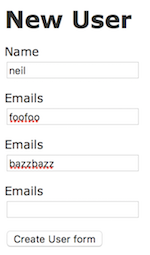I am having a tough time figuring out how to make a form_object that creates multiple associated objects for a has_many association with the virtus gem.
Below is a contrived example where a form object might be overkill, but it does show the issue I am having:
Lets say there is a user_form object that creates a user record, and then a couple associated user_email records. Here are the models:
# models/user.rb
class User < ApplicationRecord
has_many :user_emails
end
# models/user_email.rb
class UserEmail < ApplicationRecord
belongs_to :user
end
I proceed to create a a form object to represent the user form:
# app/forms/user_form.rb
class UserForm
include ActiveModel::Model
include Virtus.model
attribute :name, String
attribute :emails, Array[EmailForm]
validates :name, presence: true
def save
if valid?
persist!
true
else
false
end
end
private
def persist!
puts "The Form is VALID!"
puts "I would proceed to create all the necessary objects by hand"
# user = User.create(name: name)
# emails.each do |email_form|
# UserEmail.create(user: user, email: email_form.email_text)
# end
end
end
One will notice in the UserForm class that I have the attribute :emails, Array[EmailForm]. This is an attempt to validate and capture the data that will be persisted for the associated user_email records. Here is the Embedded Value form for a user_email record:
# app/forms/email_form.rb
# Note: this form is an "Embedded Value" Form Utilized in user_form.rb
class EmailForm
include ActiveModel::Model
include Virtus.model
attribute :email_text, String
validates :email_text, presence: true
end
Now I will go ahead and show the users_controller which sets up the user_form.
# app/controllers/users_controller.rb
class UsersController < ApplicationController
def new
@user_form = UserForm.new
@user_form.emails = [EmailForm.new, EmailForm.new, EmailForm.new]
end
def create
@user_form = UserForm.new(user_form_params)
if @user_form.save
redirect_to @user, notice: 'User was successfully created.'
else
render :new
end
end
private
def user_form_params
params.require(:user_form).permit(:name, {emails: [:email_text]})
end
end
The new.html.erb:
<h1>New User</h1>
<%= render 'form', user_form: @user_form %>
And the _form.html.erb:
<%= form_for(user_form, url: users_path) do |f| %>
<% if user_form.errors.any? %>
<div id="error_explanation">
<h2><%= pluralize(user_form.errors.count, "error") %> prohibited this User from being saved:</h2>
<ul>
<% user_form.errors.full_messages.each do |message| %>
<li><%= message %></li>
<% end %>
</ul>
</div>
<% end %>
<div class="field">
<%= f.label :name %>
<%= f.text_field :name %>
</div>
<% unique_index = 0 %>
<% f.object.emails.each do |email| %>
<%= label_tag "user_form[emails][#{unique_index}][email_text]","Email" %>
<%= text_field_tag "user_form[emails][#{unique_index}][email_text]" %>
<% unique_index += 1 %>
<% end %>
<div class="actions">
<%= f.submit %>
</div>
<% end %>
Note: If there is an easier, more conventional way to display the inputs for the user_emails in this form object: let me know. I could not get fields_for to work. As shown above: I had to write out the name attributes by hand.
The good news is that the form does render:
The html of the form looks ok to me:
When the above input is submitted: Here is the params hash:
Parameters: {"utf8"=>"✓", "authenticity_token"=>”abc123==", "user_form"=>{"name"=>"neil", "emails"=>{"0"=>{"email_text"=>"foofoo"}, "1"=>{"email_text"=>"bazzbazz"}, "2"=>{"email_text"=>""}}}, "commit"=>"Create User form"}
The params hash looks ok to me.
In the logs I get two deprecation warnings which makes me think that virtus might be outdated and thus no longer a working solution for form objects in rails:
DEPRECATION WARNING: Method to_hash is deprecated and will be removed in Rails 5.1, as
ActionController::Parametersno longer inherits from hash. Using this deprecated behavior exposes potential security problems. If you continue to use this method you may be creating a security vulnerability in your app that can be exploited. Instead, consider using one of these documented methods which are not deprecated: http://api.rubyonrails.org/v5.0.2/classes/ActionController/Parameters.html (called from new at (pry):1) DEPRECATION WARNING: Method to_a is deprecated and will be removed in Rails 5.1, asActionController::Parametersno longer inherits from hash. Using this deprecated behavior exposes potential security problems. If you continue to use this method you may be creating a security vulnerability in your app that can be exploited. Instead, consider using one of these documented methods which are not deprecated: http://api.rubyonrails.org/v5.0.2/classes/ActionController/Parameters.html (called from new at (pry):1) NoMethodError: Expected ["0", "foofoo"} permitted: true>] to respond to #to_hash from /Users/neillocal/.rvm/gems/ruby-2.3.1/gems/virtus-1.0.5/lib/virtus/attribute_set.rb:196:in `coerce'
And then the whole thing errors out with the following message:
Expected ["0", <ActionController::Parameters {"email_text"=>"foofoo"} permitted: true>] to respond to #to_hash
I feel like I am either close and am missing something small in order for it to work, or I am realizing that virtus is outdated and no longer usable (via the deprecation warnings).
Resources I looked at:
I did attempt to get the same form to work but with the reform-rails gem. I ran into an issue there too. That question is posted here.
Thanks in advance!


